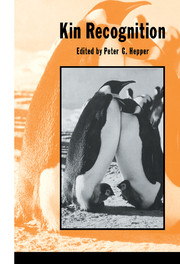Book contents
- Frontmatter
- Contents
- List of contributors
- Preface
- Introduction
- 1 The correlation between kinship and behaviour in non-human primates
- 2 Co-operation and reciprocity in birds and mammals
- 3 Kinship and fellowship in ants and social wasps
- 4 Successes and failures of parent–offspring recognition in animals
- 5 Kinship, kin discrimination and mate choice
- 6 Genetic components of kin recognition in mammals
- 7 Kin recognition in amphibians
- 8 Kin recognition cues of vertebrates
- 9 Recognizing kin: ontogeny and classification
- 10 Parental states as mechanisms for kinship recognition and deception about relatedness
- 11 Fetal learning: implications for the development of kin recognition
- 12 Information processing and storage during filial imprinting
- 13 The honey bee as a model kin recognition system
- 14 Mutual mother–infant recognition in humans
- Author index
- Species and common name index
- Subject index
1 - The correlation between kinship and behaviour in non-human primates
Published online by Cambridge University Press: 06 January 2010
- Frontmatter
- Contents
- List of contributors
- Preface
- Introduction
- 1 The correlation between kinship and behaviour in non-human primates
- 2 Co-operation and reciprocity in birds and mammals
- 3 Kinship and fellowship in ants and social wasps
- 4 Successes and failures of parent–offspring recognition in animals
- 5 Kinship, kin discrimination and mate choice
- 6 Genetic components of kin recognition in mammals
- 7 Kin recognition in amphibians
- 8 Kin recognition cues of vertebrates
- 9 Recognizing kin: ontogeny and classification
- 10 Parental states as mechanisms for kinship recognition and deception about relatedness
- 11 Fetal learning: implications for the development of kin recognition
- 12 Information processing and storage during filial imprinting
- 13 The honey bee as a model kin recognition system
- 14 Mutual mother–infant recognition in humans
- Author index
- Species and common name index
- Subject index
Summary
In 1986 Carolyn Ehardt and I published a paper, ‘The influence of kinship and socialization on aggressive behaviour in rhesus monkeys (Macaca mulatta)’ The title of this paper is not unusual; it asserts that kinship is an independent variable that influences aggressive behaviour, as a dependent variable. This suggests that manipulation of the first will alter the second. Naturally we would be quick to deny a causal relationship and would repeat that science only demonstrates correlations, not causation. But why then did we not title the paper, ‘The influence of aggressive behaviour on kinship’? If we had done so, many would have quickly pointed to this as an example of a backward causal argument. In fact, despite our denials, we do attempt to suggest causal relationships in our correlations and, in this case, as in many others, there is a clear correlation between two variables but there may be no direct causal relationship.
Perhaps we have acknowledged the contributions of Tinbergen (1951) only to fail to apply them to our own thinking. All too often we confuse function with proximal cause, evolutionary cause, and even structure (as in definitions like ‘the process leading to’). Functional outcomes are argued to be the motivational cause of behaviour (the animal was ‘trying to drive the predator away’) and if something functions in an adaptive fashion we often assume that this is because it was selected for this function during evolution birds developed wings in order to fly south in the winter).
- Type
- Chapter
- Information
- Kin Recognition , pp. 6 - 29Publisher: Cambridge University PressPrint publication year: 1991
- 21
- Cited by



